By:
- Lily Chen
Published Date
By:
- Lily Chen
Share This:
2019 Outstanding Graduates
Recognizing the diversity, accomplishments and hard work of UC San Diego’s graduates
This June, thousands of students will come together and celebrate their journey as UC San Diego students in the campus’ many commencement ceremonies. With inspirational advice from commencement speaker former Secretary of State Madeleine Albright and student speaker Michaela Juels, these graduates will go out into the world, armed with their UC San Diego degree, and pursue their dreams.
For many, the path to completion was not an easy one, but through their perseverance and dedication, they made it to the finish line. From surviving a stroke, to empowering women suffering from perinatal mood and anxiety disorders, and using dance to bring communities together, these outstanding graduates have embodied what it means to be a UC San Diego student. Here are some of their stories:
Erik Abram Hernandez Overcomes Obstacles to Become Human Rights Hero
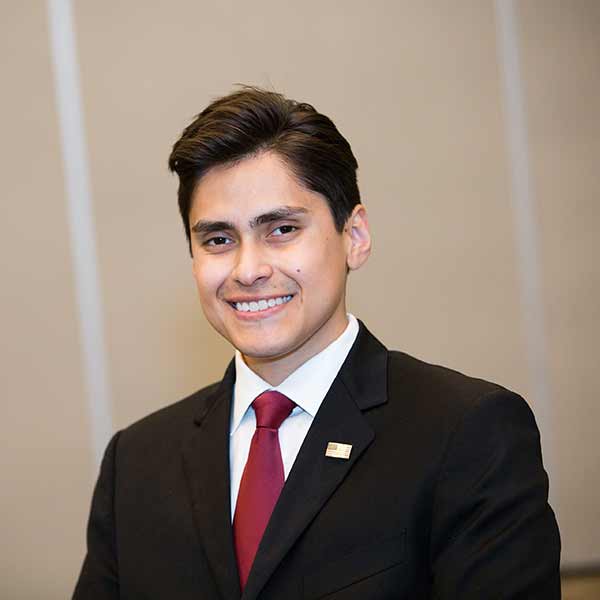
Erik Abram Hernandez
MAJOR: Literatures in English
COLLEGE: Eleanor Roosevelt College
Giving back has always been important to Erik Hernandez. Through the Make-A-Wish Foundation, a 15-year-old Hernandez used his wish to provide food and water to children in Africa. This led to the creation of Erik’s Harvest, a program founded by Hernandez that provides education and support to children through community gardens and fish ponds in Zambia, Ethiopia and Malawi. His efforts led him to be recognized by the American Bar Association as a “human rights hero.”
Hernandez was inspired to attend UC San Diego after a memorable field trip in junior high, and thanks to the Chancellor’s Associate Scholarship Program, he was able to do just that. As a first-generation college student and son of immigrants, the scholarship has allowed him to dream big without being burdened by student debt. When coupled with financial aid, the program offers students resources that cover the cost of education, including housing and supplies, making it possible for families and students to avoid loans while earning their undergraduate degree. The additional resources have been especially important to Hernandez because of his ongoing medical expenses due to a disability. During his time at UC San Diego, Hernandez interned with Congressman Jim Costa as part of the UC Washington Center (UCDC) program and studied abroad in Tokyo at the International Christian University, also known as the Kingdom of Language. “In D.C., I worked with my fellow staffers to pass a bill that provided millions of dollars to child advocacy centers across the nation,” he said. “The privilege of being able to work for the constituents of district 16 opened my eyes to the value of service to others and the happiness that it brings me.”
As an advocate for human rights, children and the disabled, and being a disabled transfer student himself, Hernandez continues to shatter barriers that perpetuate discrimination and contribute to marginalization. “One of my favorite quotes is by Haben Grima,” he said. “ ‘Disability is not something we overcome, it’s a part of human diversity, it’s something to be tapped into.’ ”
In law school and beyond, Hernandez hopes to use his UC San Diego education to strengthen the legal framework to improve the lives of children in this country, while leading global efforts to promote education and empower underserved communities as well as disabled populations.
Albert Lee Daniel: Former Marine and Father of Three Perseveres to Earn Degree after Suffering from Stroke
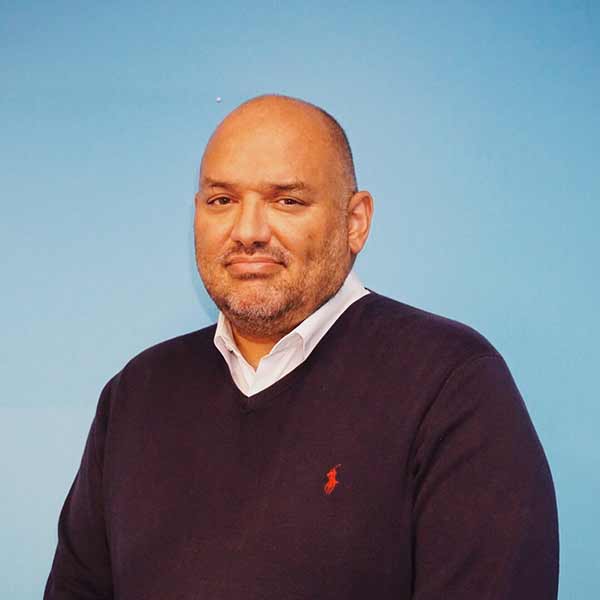
Albert Lee Daniel
MAJOR: Political science
COLLEGE: Sixth College
When Albert Lee Daniel took a math assessment test at a local community college five years ago, he had flashbacks to the time he received an “F” in algebra during the seventh grade. This incident followed him through to his high school graduation in 1983, when Daniel decided to enlist in the United States Marine Corps, just nine days after his 17th birthday. After the military, he began working in the hospitality industry, which launched his career in accounting. “For the next 30 plus years, I wore my lack of education as a badge of honor,” he said “I reveled in being an auto didactic learner and I was inquisitive and a voracious reader. I used to say, ‘I know a little bit about a lot of things.’ Now, while that might help me win at Jeopardy, as I grew older, I knew I would hit the glass ceiling of not possessing a college degree.”
After two of his daughters graduated from college, Daniel enrolled at MiraCosta College in 2014, eager to start pursuing his education again. He was able to obtain an associate’s degree in 2017 and transfer to UC San Diego. “One of the happiest days of my life was receiving the acceptance email from UC San Diego,” said Daniel. However, in spring 2018, Daniel suffered an arteriovenous malformation (AVM), a mass of veins and arteries that had grown together in his brain and then burst, which led to his withdrawal from school. “Fast forward six weeks and I had an angioplasty and neurosurgery to remove the AVM,” he said. “I suffered a stroke while in ICU and lost vision in my left eye…I dropped my spring classes while lying in a hospital bed, but I never wanted to give up on my education.”
Daniel was able to make up the classes he dropped by enrolling in summer session. He took the bus and trolley to and from his mother-in-law’s house in order to attend classes. This past fall, while still recuperating from his surgery, he was able to enroll in four classes and live on campus, with the help from the Office for Students with Disabilities and Housing, Dining and Hospitality.
After graduation, Daniel hopes to use his political science and public law degree to work either in non-profit or admissions and recruitment at the university or community college level. “I have the benefit of having lived quite a long time before my brain injury; however, it could have happened to me many years ago,” he said. “I have already done many things you hope to do – marry, have children, have a career, buy a house. The earning of this degree does not complete my life but complements it, and I hope to represent UC San Diego in a positive light wherever life takes me.”
Seasoned Journalist Takes Nontraditional Path to Education to Inspire Others to Achieve Their Dreams
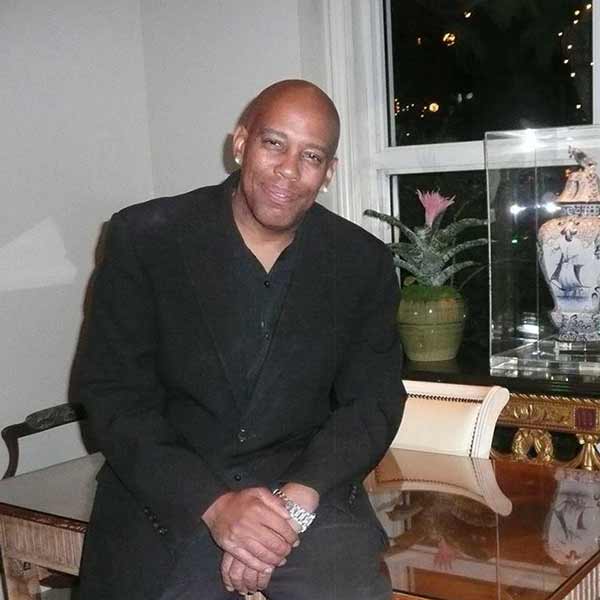
Buddy Sampson
MAJOR: Communication
COLLEGE: Thurgood Marshall College
Most incoming freshmen do not have a resume as impressive as Buddy Sampson. But then again, Sampson is no ordinary student. A seasoned journalist, editor and musician from Philadelphia, he took the non-traditional path to higher education and eventually ended up at UC San Diego, studying communication. “UC San Diego has a great communication program,” he said. “I also wanted to show older people, of all races and ethnicities, that it’s never too late to achieve your dream of getting a degree.”
Before arriving at UC San Diego, Sampson worked as a journalist starting in 1989 and covered a variety of major events such as the OJ Simpson trial, the Los Angeles Riots and presidential elections. “It’s hard for me to pick one favorite memory from my career,” he said. “I’ve interviewed people like Bill Clinton, Nicole Kidman and Tom Cruise, but my favorite interview has to be with my friend Johnny Sherman, who raised children as a single black dad, countering the negative stereotype of the deadbeat, black dad.” From 2002-08, he produced a critically acclaimed television show, “People You Should Know,” where he would perform with and interview entertainment and music stars. As a musician, Sampson has played with several Philadelphia and Los Angeles music stars and generated a reputation as an energetic performer. He still produces and performs charity shows.
As an older student, Sampson loved being a part of UC San Diego’s graduate housing and enjoyed the beautiful beaches and surrounding area of La Jolla. He managed to juggle being a full-time student as well as working as the editor-in-chief and publisher of The Scoop LA, a newspaper targeted toward African-American readers that was founded in 1967. “It was very challenging,” he said about supervising The Scoop LA with a full course load. “The publishing industry has changed a lot and being at UC San Diego has given me some new ideas to bring back to my work.” During his time at UC San Diego, Sampson has been a member of the National Society of Leadership and Success, worked as a community service officer and is an active member of the executive committee at Thurgood Marshall College.
For his honors thesis, Sampson drew on his experiences as an older African-American student on campus. “Being a non-traditional student is how true change happens in the world, so I hope to inspire other, non-traditional students to think that anything is possible,” he said. “I want to say to students that they are the light of the world, that they can change the world paradigm and not to listen to people that say, ‘you don’t matter’ or ‘they don’t matter.’ You do matter, and each of us are capable of making change in the world.”
Xiangdi Zhang Bridging Cultural and International Gaps Through Dance
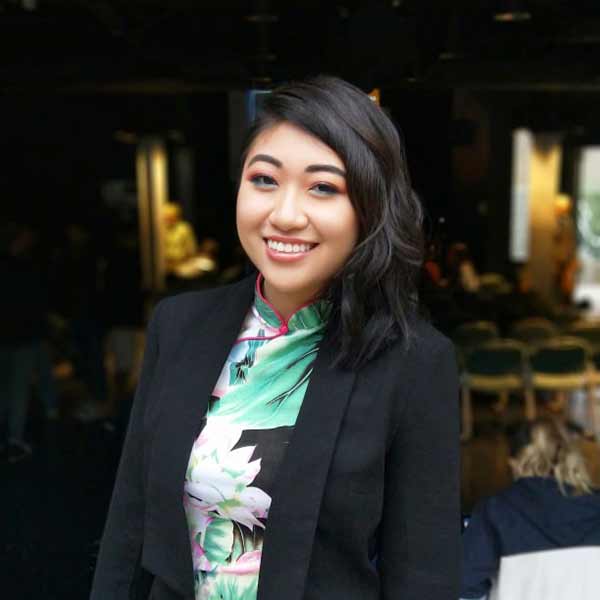
Xiangdi Zhang
MAJOR: International Studies – business and political science
COLLEGE: Sixth College
When Xiangdi Zhang was 15, she moved from Beijing to Connecticut by herself to start high school in America. The move was something her parents wanted so that she would receive a better education. Despite the language and cultural barrier that existed between herself and her new environment, she joined her high school dance team and gained a new sense of belonging. “Since then, dance has been a language and a way of communication for me to understand social problems around the world,” said Zhang.
At UC San Diego, she became involved with Movement Exchange, a non-profit organization that aims to unite dance and service and ensure that dance education is accessible to all. Starting as a volunteer, Zhang was exposed to a different side of dance and a completely new audience. She began to lead dance workshops at foster care centers and special needs schools, using dance as a way to address behavioral issues with kids who had adverse childhood experiences. Through Zhang’s positive experiences with these social programs, she started applying for grants to test the importance of dance education and how it can address the need in social care of trauma-informed behavioral therapy.
Last fall, she was inspired to start Dance by the Border, a monthly dance exchange bringing students from UC San Diego to Tijuana, Mexico to learn about the border and its surrounding issues with a non-political approach. “I had already gone on two international service dance exchanges with Movement Exchange where I taught at local orphanages in Panama,” said Zhang. “I loved the dance exchange because it’s not just your regular international border voluntourism trip. It’s a holistic view of the community and what they’re facing, and I wanted to take that model and apply it to the pressing issue of the U.S.-Mexico border.” Leading by example, Zhang began to cross the border on a weekly basis in an effort to build up a local presence of the program and establish relationships with Mexican shelters and humanitarian organizations. “I convinced local shop owners to put up our program flyers in their stores,” she said. “With the help of Border Angels, a migrant rights advocacy group, a local yoga master agreed to let us organize a dance class after his yoga class and opened his home for our participants to spend the night in our two-day exchange program.”
Zhang is currently participating in the UC Washington Center (UCDC) program and interning with Congressman Salud Carbajal (D-24). After graduation, she hopes to continue her international work and start a venture group that will invest in transnational social innovations. “The six years I’ve spent away from home has taught me the importance of community building,” said Zhang. “I want my venture group to empower those who are already doing great things in their community and also incentivize those who dive into the world of social innovation.”
Niranjanaa Jeeva and Julie Yip (Social Innovators Working to Reduce Postpartum Depression Rates among Low-Income Mothers)
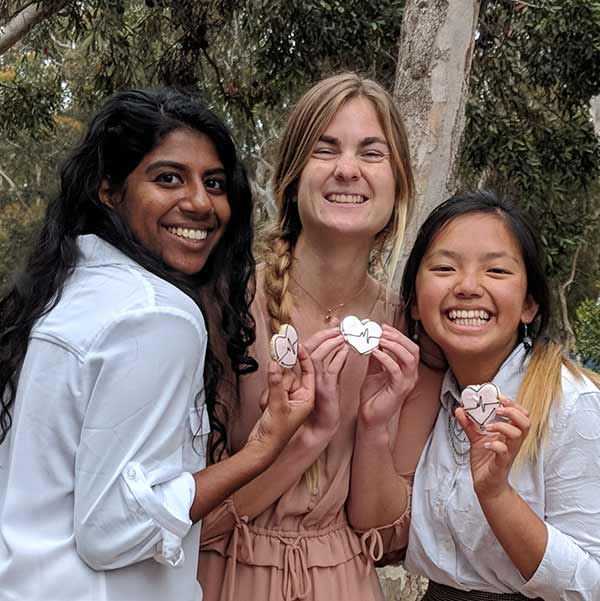
Niranjanaa Jeeva, Ella Stimson, ’20, and Julie Yip
MAJOR: Bioengineering: Bioengineering; Bioengineering: Biotechnology
COLLEGE: Eleanor Roosevelt College; Earl Warren College
Niranjanaa Jeeva and Julie Yip, along with Ella Stimson, ’20, met at UC San Diego’s HealthHack in 2016, an annual interdisciplinary hackathon hosted by UC San Diego Health and UC San Diego’s Engineering World Health, an undergraduate student-led organization. There, they developed a startup called Hapty Hearts to support mothers through postpartum challenges. “Through our research, we’ve discovered that perinatal mood and anxiety disorders (PMADs) can affect women in low-income families and households at almost double the rate,” said Jeeva. “That was something that was just unacceptable.” PMADs is a term that describes emotional conditions that may arise in women during pregnancy and after giving birth, most commonly manifesting itself in postpartum depression.
They developed a wearable device that would be available to low-cost to families most affected by PMADs. Using haptic feedback, also known as touch feedback, the devices connect mother and baby through heartbeat. The wearables are designed as a sock for the baby and blanket for the mother, and they help alleviate the symptoms of PMADs, which can include anxiety and depression. The rhythmic pulse generated from the sock is delivered via Bluetooth to the blanket a mother wraps around herself to feel intimately connected to her child even when not holding her baby. “We weren’t inspired by a specific case of postpartum depression but when we started interviewing mothers to learn about their stories, we learned that all cases are unique and complex,” said Yip. “It was truly humbling to learn more about various cases, and even more so, to be educated on the more inclusive umbrella term of PMADs.”
Jeeva, Yip and Stimson took their idea to The Basement, one of UC San Diego’s many resources for student entrepreneurs. Through their affiliation with The Basement, they have had the opportunity to participate in events such as Converge Summer Incubator, the Ignite Conference, Triton Entrepreneur Night and the most recent Clinton Global Initiative University Conference. .
Yip graduated last winter and Jeeva is graduating this year, while Stimson is expected to graduate next spring. Yip has been working in public health research at the Center of Gender Equity and Health on intimate partner violence and transmission of sexually transmitted diseases, specifically HIV/AIDS and congenital syphilis. After graduation, she hopes to find research and development engineering positions and potentially work as a designer, engineer and entrepreneur in the global women’s health field. Jeeva will be attending Johns Hopkins University to pursue a master’s degree at the Center for Bioengineering Innovation and Design.
Savitri Arvey’s Research Makes Headlines on Growing Humanitarian Crisis along U.S.-Mexican Border
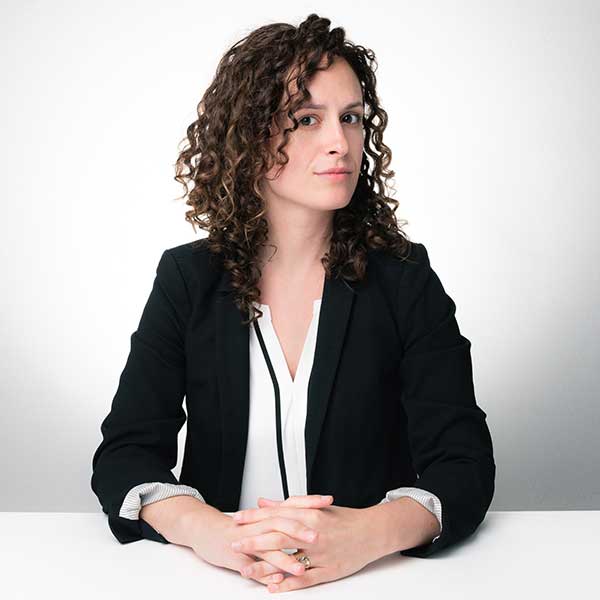
Savitri Arvey
Major: Master’s of Public Policy candidate, School of Global Policy and Strategy
UC San Diego lies less than 30 miles north of the San Ysidro Port of Entry. In the last year, the ever-changing border has seen an exponential increase in the number of asylum-seekers, including many families, trying to flee violence and poverty in their homelands. The humanitarian crisis has been at the center of Savitri Arvey’s trail-blazing research. The graduate student at UC San Diego’s School of Global Policy and Strategy (GPS) and researcher at the school’s Center for U.S.-Mexican Studies led an effort to conduct the most comprehensive analysis of asylum seekers waiting to enter the U.S., and the wait list structures. “I decided to study the current administration’s changes in asylum processing policies because I saw differences in how they were being rolled out across the border and the devastating impact on asylum seekers,” said Arvey. Arvey and collaborators compiled fieldwork carried out in 13 cities along the U.S.-Mexico border, drawing upon interviews with government officials, representatives from civil society organizations and journalists.
The latest report Arvey contributed to revealed that the number of asylum seekers along the U.S.-Mexican border is close to 19,000, just days after the Associated Press estimated the number at 13,000. “Our latest report shows that the situation in border cities is getting worse over time,” said Arvey, who will earn a master in public policy this spring. “We found that migrant shelters across the entire border are over capacity. This has left thousands of asylum seekers to rent hotel rooms or even sleep on the streets, increasing their vulnerability for predation by organized crime or other opportunistic actors.” Arvey’s work has been cited by Vice Media, the San Francisco Chronicle, and the San Diego Union-Tribune as well as many international news outlets and the Mexican government.
“I’ve spent the last seven years focusing on U.S.-Mexico relations—first educational exchange and now migration—because I believe that a better understanding of our shared history and culture can translate into more effective policy on both sides of the border,” she added. Her dedication to Latin American studies has been prevalent throughout her academic career. As a student, she received the Ryoichi Sasakawa Young Leaders Sylff fellowship as well as the Joseph Grunwald Award for Significant Contribution in the Promotion of Inter-American Understanding along with other awards and grants. She also volunteers at the San Diego Rapid Response Network Migrant Shelter, and serves as managing director for the Journal of International Policy Solutions (JIPS) and Director for the External Affairs for Latin American Students Organization (LASO) at GPS.
After graduation, Arvey will continue to conduct research on U.S.-Mexico border policies and Mexico’s migratory policy at the Center for US-Mexican Studies (USMEX).
Share This:
You May Also Like
Stay in the Know
Keep up with all the latest from UC San Diego. Subscribe to the newsletter today.



